Have you ever wondered why certain grains seem to trigger your Irritable Bowel Syndrome (IBS) symptoms, while others don’t? If you’re nodding in agreement, you’re not alone. IBS, a chronic gastrointestinal disorder, can significantly impact your quality of life. This article delves into the complex relationship between grains and IBS, helping you understand how your dietary choices can either soothe or exacerbate your symptoms.
IBS is a chronic gastrointestinal disorder with symptoms like abdominal pain, bloating, diarrhea, and constipation. While the exact cause of IBS is not fully understood, it’s widely recognized that diet plays a crucial role in managing its symptoms.
Your dietary choices, including the types of grains you consume, can either trigger or alleviate IBS symptoms. Whole grains, often touted for their health benefits, contain FODMAPs (Fermentable Oligosaccharides, Disaccharides, Monosaccharides, and Polyols), which are known to exacerbate IBS symptoms in some individuals.
On the other hand, refined grains like white rice are lower in FODMAPs and may be better tolerated. By understanding the FODMAP content of different grains and your personal tolerance levels, you can better manage your IBS symptoms.
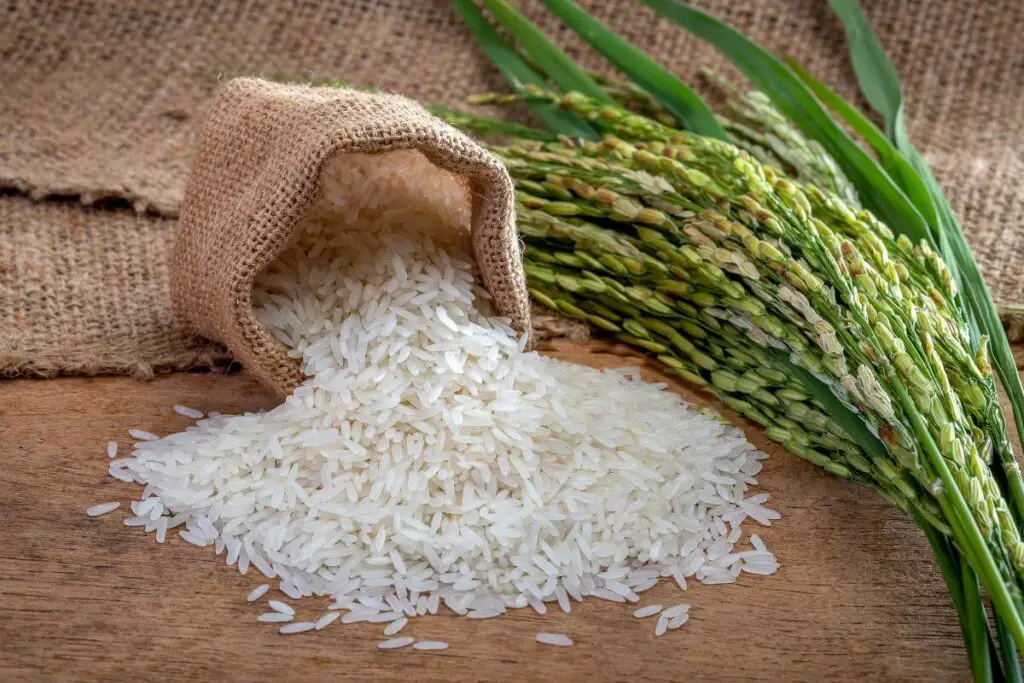
In this article, we’ll explore the FODMAP content of various grains, offering a comprehensive list of low-FODMAP grains that are generally safe for IBS sufferers. We’ll also discuss high-FODMAP grains to avoid, the potential benefits of sprouted grains, and the ongoing debate between whole grains and refined grains in the context of IBS.
We will also cover the often-misunderstood role of gluten in IBS and guidance on choosing IBS-friendly bread and cereal options. Finally, we’ll offer practical tips for incorporating safe grains into your daily diet, ensuring a balance that supports your overall health and well-being.
- Related: Food to Eat With IBS
Grains and IBS: Key Takeaways
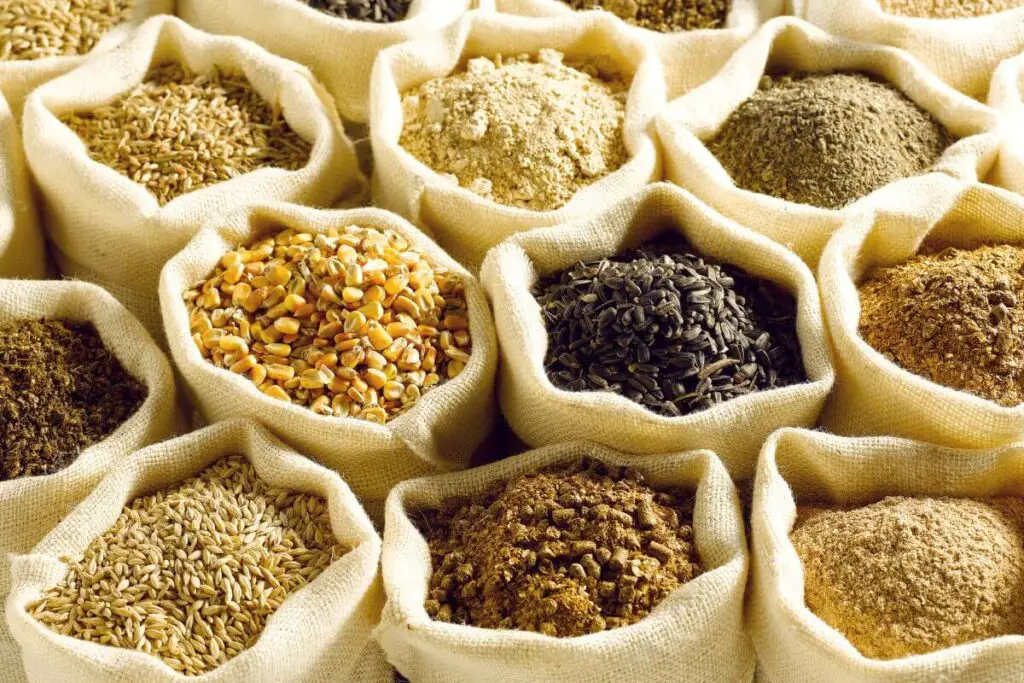
- Grains and IBS: The Low-FODMAP Approach
- Grains high in FODMAPs like wheat, barley, and rye can trigger IBS symptoms.
- Identifying low-FODMAP grains such as white rice, oats, and quinoa can offer safer alternatives.
- Working with a registered dietitian can help personalize your low-FODMAP diet.
- Whole Grains vs. Refined Grains: Finding the Right Balance
- Whole grains contain more dietary fiber and FODMAPs than refined grains.
- Experimenting with different grain types and portion sizes can help manage IBS symptoms.
- Personal tolerance varies, so individualized approaches are key.
- The Role of Gluten in IBS: Navigating Gluten Sensitivity
- Gluten sensitivity may exacerbate IBS symptoms in some individuals.
- A gluten-free diet can be beneficial for those with non-celiac gluten sensitivity (NCGS).
- Proper testing and guidance from healthcare professionals are essential when considering a gluten-free diet.
- The Surprising Impact of Sprouted Grains on IBS
- Sprouted grains can be easier to digest and lower in FODMAPs for some individuals.
- Introducing sprouted grains slowly can help gauge their impact on IBS symptoms.
- The nutritional benefits of sprouted grains make them a compelling option for IBS management.
- Bread Choices for IBS: Sourdough, Rye, and Beyond
- Sourdough and rye breads are often more gut-friendly due to their fermentation process and lower fructan content.
- Spelt bread is another low-FODMAP bread alternative to consider.
- Making your own bread or carefully selecting commercial options can enhance your IBS management.
- Breakfast Cereals and IBS: The Corn Flakes Conundrum
- Corn flakes can be problematic for IBS due to added high-fructose corn syrup.
- Low-FODMAP alternatives like rice-based cereals and gluten-free corn flakes offer breakfast options.
- Mindful portion control and ingredient awareness are essential even with low-FODMAP choices.
- Tailoring Your Grain Choices for IBS
- IBS management is about understanding your body’s signals and making informed dietary choices.
- Grains are just one part of the puzzle, and individualized approaches are key.
- The goal is to strike a balance that keeps your gut happy, allowing you to enjoy a varied and satisfying diet.
The Connection Between Grains and IBS Symptoms
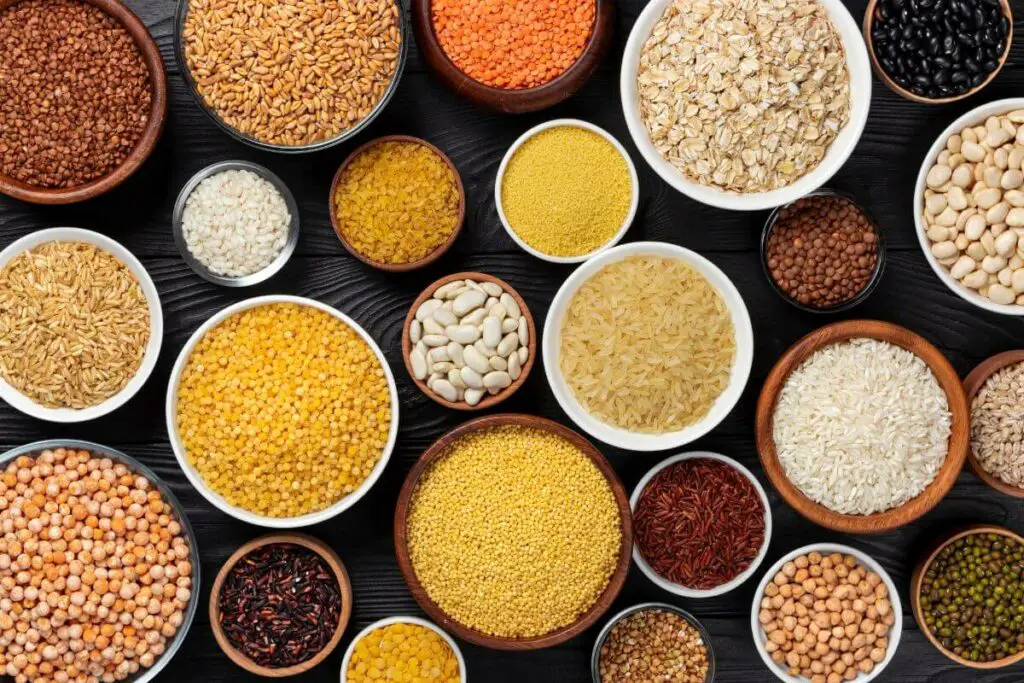
Ever wondered why that whole grain bread you love might not love you back? Well, it’s all about the FODMAPs.
FODMAPs are a group of carbohydrates that can cause digestive distress in some people, particularly those with IBS. Now, when it comes to grains, the main FODMAP culprits are fructans, a type of carbohydrate.
Wheat, a common grain, is a major source of fructans. This means that whole wheat products, along with other grains like rye and barley, are often high in FODMAPs.
So, if you have IBS and find that whole grains trigger your symptoms, it’s not the fiber but the fructans that are likely causing the trouble.
Here are a few common grains and their FODMAP content to keep in mind:
- High-FODMAP Grains: Whole wheat, rye, barley
- Low-FODMAP Grains: White rice, oats, quinoa
This doesn’t mean you have to give up grains entirely. You can still enjoy low-FODMAP options like white rice, oats, and quinoa. Just be mindful of portion sizes and how your body responds.
If you’re unsure which of the wide range of grains work best for you, consider working with a registered dietitian who can help you navigate the low-FODMAP diet and identify your personal triggers.
Remember, everyone’s gut is unique, so what works for one person may not work for another. The key is to listen to your body and make choices that support your digestive health.
1. Identifying Low-FODMAP Grains for IBS Management
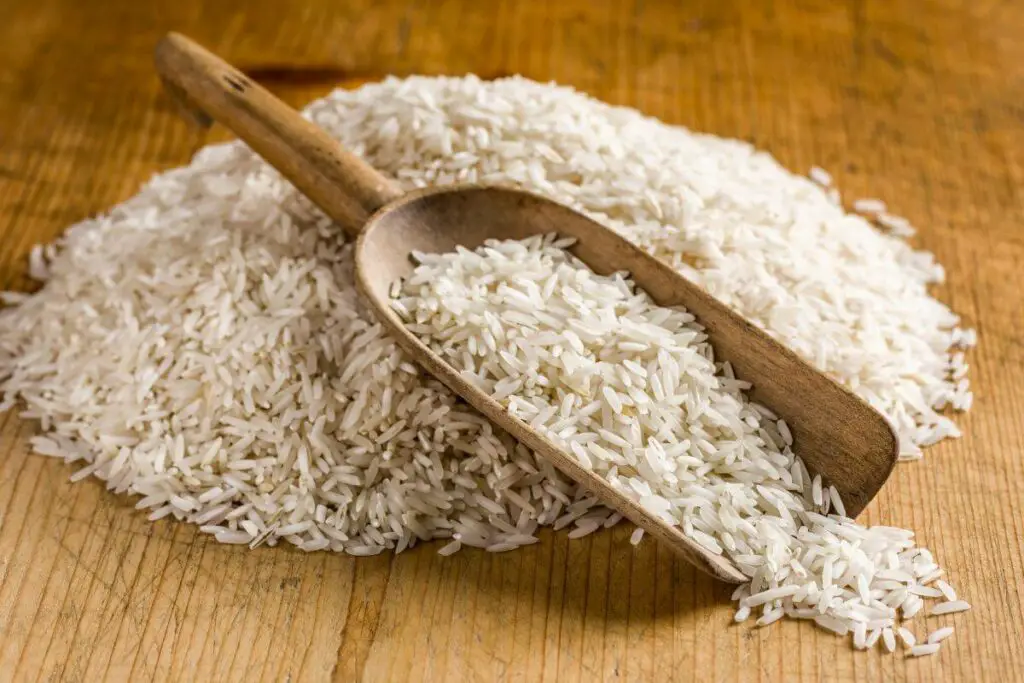
When you’re dealing with IBS, the last thing you want is a dietary gamble. That’s where low-FODMAP grains come in, offering you a safer bet for your gut. Here’s a quick list of low-FODMAP grains that could become your new pantry staples:
- Rice: Whether it’s white, brown, or wild, rice is a low-FODMAP grain that’s easy on your digestive system. It’s a versatile option that can form the base of many meals.
- Quinoa: This ancient grain is not just a protein powerhouse; it’s also low in FODMAPs. Use it as a substitute for rice or in salads for a nutritional boost.
- Oats: A comforting bowl of oatmeal can be IBS-friendly if you choose gluten-free oats. They’re not only low-FODMAP but also high in soluble fiber, which can help regulate your bowel movements.
Now, how do you incorporate these grains into your daily diet without getting stuck in a rut? Here are a few tips:
- Mix and match: Combine different low-FODMAP grains in your meals to keep things interesting. For example, try a rice and quinoa salad or a bowl of oats with a sprinkle of rice bran.
- Experiment with recipes: Don’t be afraid to try new recipes that feature these grains. From rice paper rolls to quinoa breakfast bowls, the options are endless.
- Portion control: While these grains are safe for IBS, portion sizes still matter. Work with a dietitian to determine the right portion sizes for your needs.
By making these simple swaps, you can enjoy a varied and satisfying diet while managing your IBS symptoms. Remember, it’s not about giving up your favorite foods; it’s about finding equally delicious alternatives that your gut will thank you for.
2. Understanding High-FODMAP Grains to Avoid
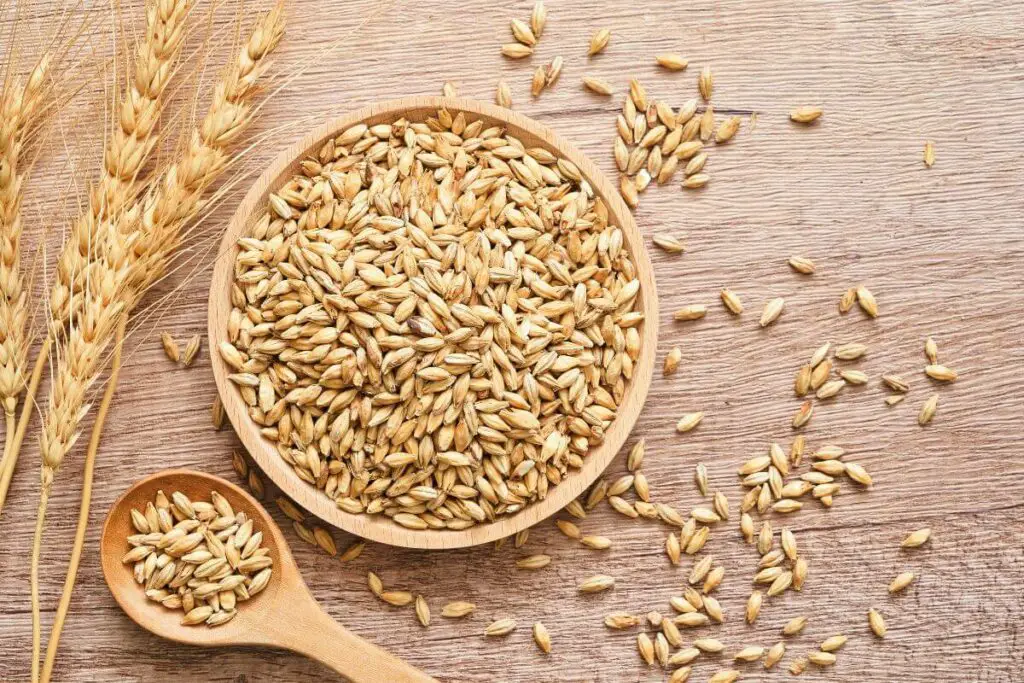
When it comes to IBS, not all grains are created equal. Some grains are high in FODMAPs, which can trigger those pesky IBS symptoms. The top culprits in this category are Barley, Rye, and Wheat.
Now, I’m not saying you have to bid adieu to these grains forever, but it’s wise to limit or avoid them, especially during a flare-up. Opting for low-FODMAP grains like rice, quinoa, and oats can be a game-changer.
Here’s a quick cheat sheet of high-FODMAP grains to avoid with IBS:
- Barley: Commonly found in soups, stews, and some breads.
- Rye: Often used in bread, rye crispbreads, and rye whiskey.
- Wheat: Found in bread, pasta, couscous, and most baked goods.
But hey, don’t panic at the thought of a bread-less existence. There’s a plethora of delicious low-FODMAP alternatives out there. And when you do indulge in a high-FODMAP grain, portion control is key.
Here are a few tips to guide your grain choices and portions:
- Read Food Labels: Look for products labeled “low-FODMAP” or “FODMAP-friendly.” These are your golden tickets to enjoying grains without the aftermath.
- Portion Control: Stick to smaller portions of high-FODMAP grains. For example, a small slice of sourdough bread might be more gut-friendly than a large bagel.
It’s all about balance and knowing your body. By understanding which grains are high in FODMAPs and how to manage them, you can still savor your favorite dishes while keeping IBS symptoms at bay.
3. The Benefits of Sprouted Grains for IBS Sufferers
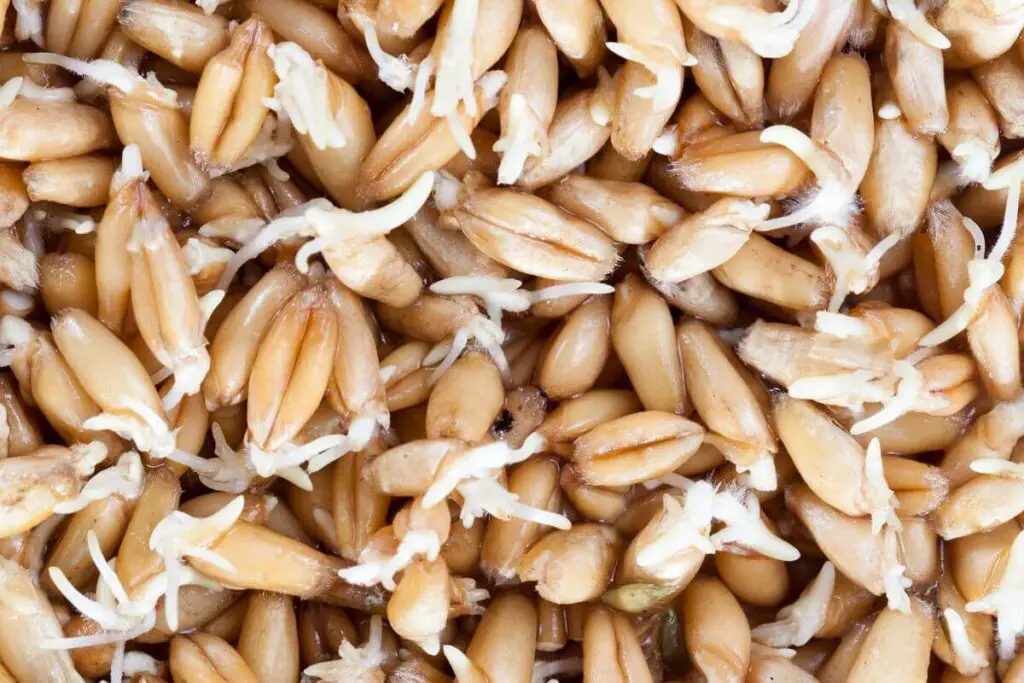
Sprouted grains, the new kid on the block, have been causing quite a stir in the nutrition world, and for all the right reasons. But what exactly are sprouted grains? Well, they’re regular grains that have been allowed to germinate, or in layman’s terms, start to grow. This process unlocks a treasure trove of nutrients and makes them easier to digest.
So, why should you, an IBS warrior, consider making the switch to sprouted grains? Here’s the lowdown:
- Enhanced Digestibility: The sprouting process breaks down complex carbohydrates and proteins into simpler forms, making them more easily digestible. This can be a game-changer for those with sensitive tummies, like yours.
- Lower FODMAP Content: While not all sprouted grains are low in FODMAPs, some studies suggest that sprouting can reduce the FODMAP content in grains like wheat and barley. This could mean less gas, bloating, and discomfort for you.
- Rich in Nutrients: Sprouted grains are a nutritional powerhouse. They’re packed with essential vitamins, minerals, and antioxidants, which can help support your overall health and well-being.
But remember, what works for one person may not work for another. If you’re intrigued by the potential benefits of sprouted grains, consider introducing them slowly into your diet and paying attention to how your body responds.
In a world where dietary advice seems to change as frequently as the weather, sprouted grains offer a refreshing and nutrient-dense alternative. So, why not give them a try? After all, a little experimentation in the kitchen might just lead you to your new favorite gut-friendly grain.
4. Whole Grains vs. Refined Grains: What’s Best for IBS?
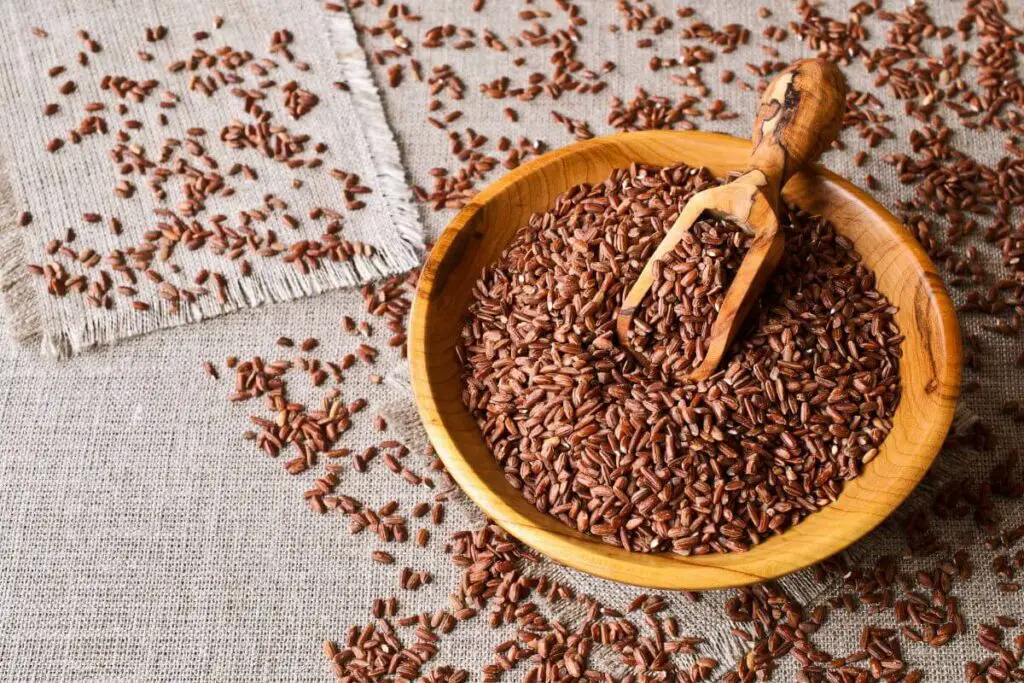
When it comes to grains and their impact on IBS, the whole vs. refined debate is a crucial one. Here’s the lowdown: Whole grains, like brown rice and quinoa, contain the entire grain kernel, including the bran, germ, and endosperm.
On the other hand, refined grains, such as white rice and white bread, have had the bran and germ removed during processing, leaving just the starchy endosperm.
So, why does this matter for IBS? Well, the bran and germ are where the majority of a grain’s dietary fiber and FODMAPs are found. Here’s a quick comparison:
| Whole Grains | Refined Grains |
|---|---|
| Higher in dietary fiber | Lower in dietary fiber |
| Higher in FODMAPs | Lower in FODMAPs |
The higher fiber content in whole grains can be both a blessing and a curse for those with IBS. While fiber is generally good for gut health and can help prevent constipation, it can also be a source of discomfort for some IBS sufferers.
Refined grains, being lower in fiber, may be gentler on the digestive system but lack the nutritional benefits of whole grains.
When it comes to the fiber, there are two main types, insoluble and soluble:
- Insoluble Fiber: Promotes regular bowel movements and adds bulk to the stool. But be careful because too much can result in making IBS symptoms worse because it’s harder to digest. Whole grains, whole wheat, brown rice, and quinoa are good insoluble fiber sources.
- Soluble Fiber: Forms a gel-like substance and dissolves in water. It’s easier to digest and helps to regulate blood sugar levels and lower cholesterol. Oats and barley are rich in soluble fiber.
So, what’s the verdict? It’s all about balance and personal tolerance. Some people with IBS find that they can tolerate certain whole grains in smaller portions, while others may need to stick to more refined options.
Experimenting with different types and amounts of grains can help you find what works best for your gut. Just remember, everyone’s digestive system is unique, so what works for one person may not work for another.
5. The Role of Gluten in IBS and the Efficacy of a Gluten-Free Diet
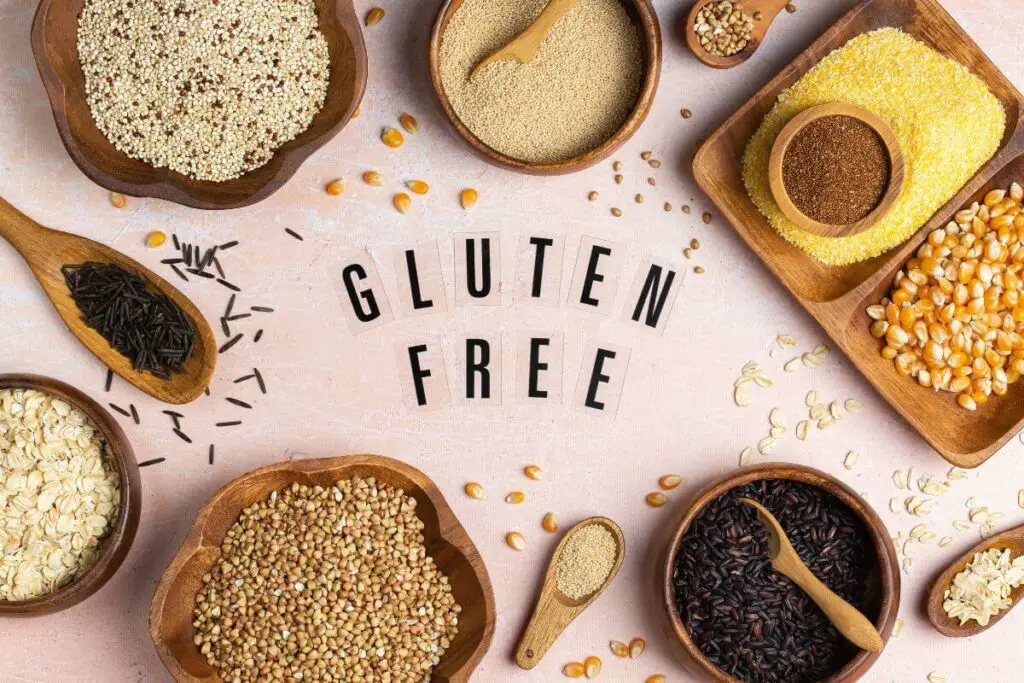
Gluten, a protein found in wheat, barley, and rye, has been a hot topic in the realm of gut health. Some people with IBS have reported symptom improvement when they eliminate gluten from their diet. However, it’s important to note that this response is not universal.
Who Might Benefit from Gluten-Free Bread and Diet?
- Individuals with IBS who have been diagnosed with non-celiac gluten sensitivity (NCGS) may experience symptom relief by cutting out gluten.
- It’s crucial to work with a healthcare provider or a registered dietitian to determine if a gluten-free diet is the right choice for you.
Gluten and IBS: Clearing the Air
- While gluten can exacerbate symptoms for some with IBS, it’s not the root cause of IBS itself.
- A gluten-free diet shouldn’t be adopted as a one-size-fits-all solution for IBS. It’s essential to identify specific trigger foods through a method like the low FODMAP diet, which is more targeted and evidence-based.
Actionable Tips for Gluten Management in IBS
If you suspect gluten might be a trigger for your IBS symptoms, consider these steps:
- Keep a food diary to track your symptoms in relation to gluten-containing foods.
- Consult a healthcare professional for proper testing to rule out celiac disease and confirm non-celiac gluten sensitivity.
- If diagnosed with NCGS, work with a dietitian to ensure a nutritionally balanced gluten-free diet.
In the landscape of gut health, the interplay between gluten and IBS is complex and individualized. While some find relief with a gluten-free approach, it’s not a guaranteed fix. As always, personalized guidance from a healthcare professional is crucial in navigating the best dietary path for your IBS management.
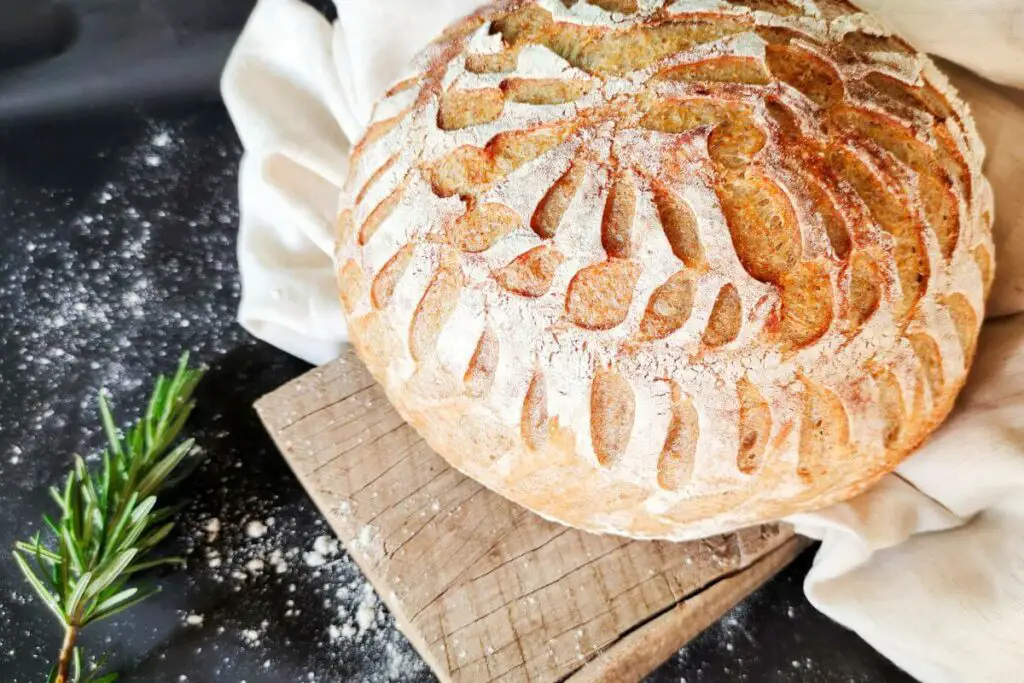
When it comes to bread, not all loaves are created equal, especially for those managing IBS. The good news is that you don’t have to bid adieu to your beloved sandwich or morning toast.
Sourdough and rye bread, for example, are often more gut-friendly than their conventional counterparts. Why Sourdough and Rye?
- Sourdough: Its fermentation process breaks down FODMAPs, making it easier on your tummy.
- Rye Bread: Contains less fructans, a type of FODMAP, than wheat.
If you’re feeling adventurous, you might want to give spelt bread a try. It’s another grain that’s lower in FODMAPs and can be a great alternative to traditional wheat bread.
Making Your Own IBS-Friendly Bread
- Sourdough Starter: Create your own sourdough starter at home. The longer fermentation process can help reduce FODMAPs.
- Rye Bread Recipe: Look for rye bread recipes that use a sourdough starter or incorporate other low-FODMAP ingredients.
If you’re not into baking, don’t worry. Many grocery stores now stock sourdough and rye bread, and some even offer spelt options. Just be sure to check the ingredients list for any high-FODMAP additives like honey or inulin.
Your bread journey doesn’t have to end here. Experiment with different grains and bread-making techniques to find what works best for your gut. And who knows, you might just discover a new favorite loaf that’s both IBS-friendly and delicious.
7. The Surprising Truth About Corn Flakes and IBS
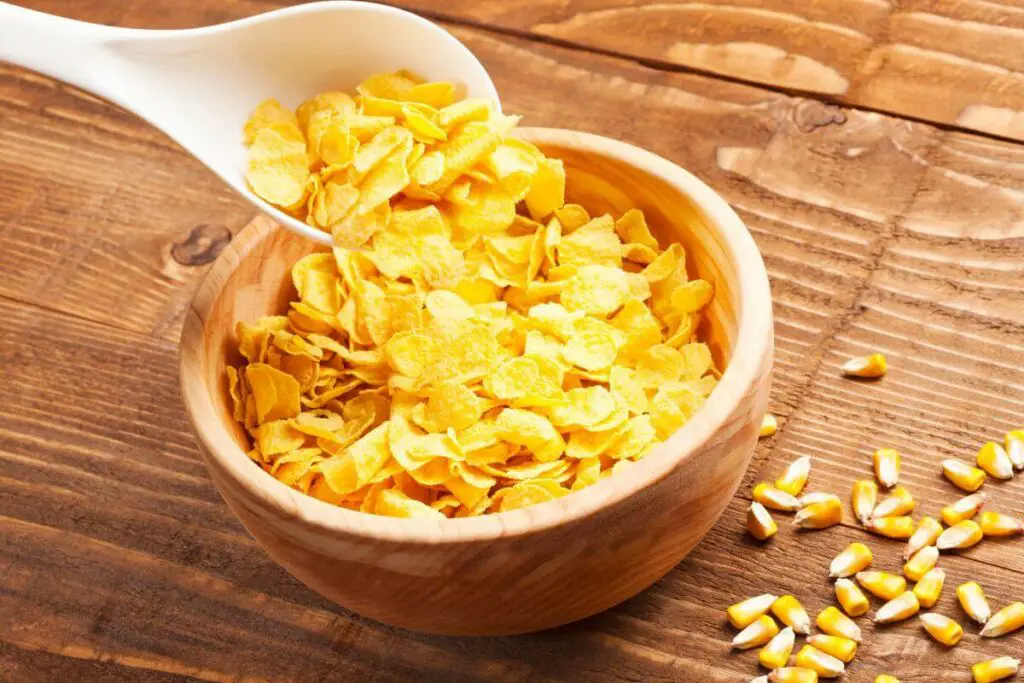
You might be surprised to learn that your morning bowl of corn flakes could be contributing to your IBS symptoms. While corn itself isn’t a high-FODMAP food, the processing and added ingredients in corn flakes can make them a trigger for some people with IBS.
Many commercial corn flakes often contain high-fructose corn syrup, a known FODMAP. This can spell trouble for your gut if you’re sensitive to FODMAPs.
But don’t worry, you don’t have to bid farewell to breakfast cereals altogether. There are plenty of IBS-friendly alternatives that can still give you that satisfying crunch in the morning.
Consider these low-FODMAP cereal options:
- Rice-based cereals
- Oat-based cereals (ensure they’re low in FODMAPs)
- Gluten-free corn flakes (without high-fructose corn syrup)
- Puffed rice
- Buckwheat-based cereals
If you’re a fan of granola or muesli, you can also find or make low-FODMAP versions by avoiding high-FODMAP ingredients like honey, dried fruit, and certain nuts.
For a quick and easy breakfast, you can pair these cereals with lactose-free or plant-based milk. Just be mindful of portion sizes, as even low-FODMAP foods can become problematic in large amounts.
So, the next time you’re perusing the cereal aisle, keep an eye out for low-FODMAP options that can keep your taste buds and your gut happy. And if you’re feeling adventurous, try making your own granola or muesli at home using low-FODMAP ingredients – it’s easier than you think!
8. How to Incorporate Grains into an IBS-Friendly Diet
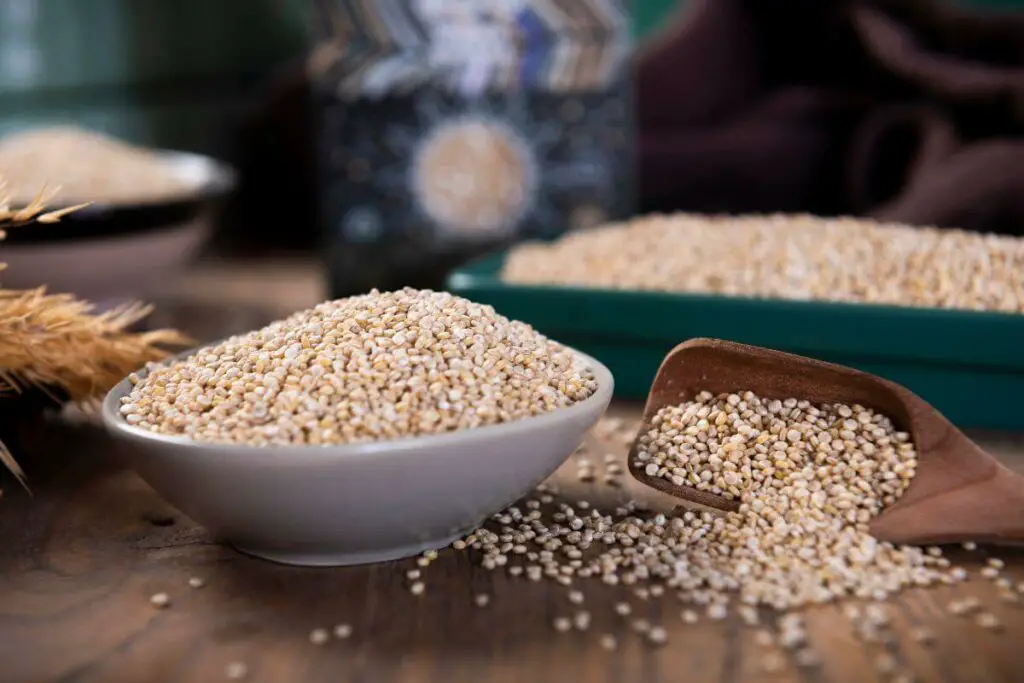
If you’re an IBS sufferer, you don’t have to give up on grains entirely. In fact, you can still enjoy a variety of whole grains like brown rice and buckwheat as part of your IBS-friendly diet. Here are some tips to help you incorporate grains without triggering flare-ups:
- Portion Control: Start with small portions and gradually increase as you gauge your tolerance.
- Whole Grains: Opt for whole grain options as they are higher in fiber and may be better tolerated than refined grains.
- Try Quinoa: This gluten-free grain is not only easy to digest but also a good source of protein.
- Soak and Sprout: Soaking and sprouting grains can make them easier to digest.
- Cook Thoroughly: Ensure your grains are cooked thoroughly to break down complex carbohydrates that may be harder to digest.
- Monitor Symptoms: Keep a food diary to track how different grains affect your symptoms.
- Pair with Low-FODMAP Foods: Combine grains with low-FODMAP foods like lean proteins, non-starchy vegetables, and healthy fats to create balanced meals.
- Experiment with Different Grains: Don’t be afraid to experiment with different grains like millet, amaranth, or oats to find what works best for you.
Balancing your diet with a variety of safe grains can not only add nutritional value but also prevent food monotony, which is common in IBS diets. Remember, everyone’s tolerance levels are different, so it’s crucial to listen to your body and work with a healthcare professional or dietitian to create a personalized meal plan that suits your needs.
Final Thoughts: Balancing Grains and IBS for Optimal Health
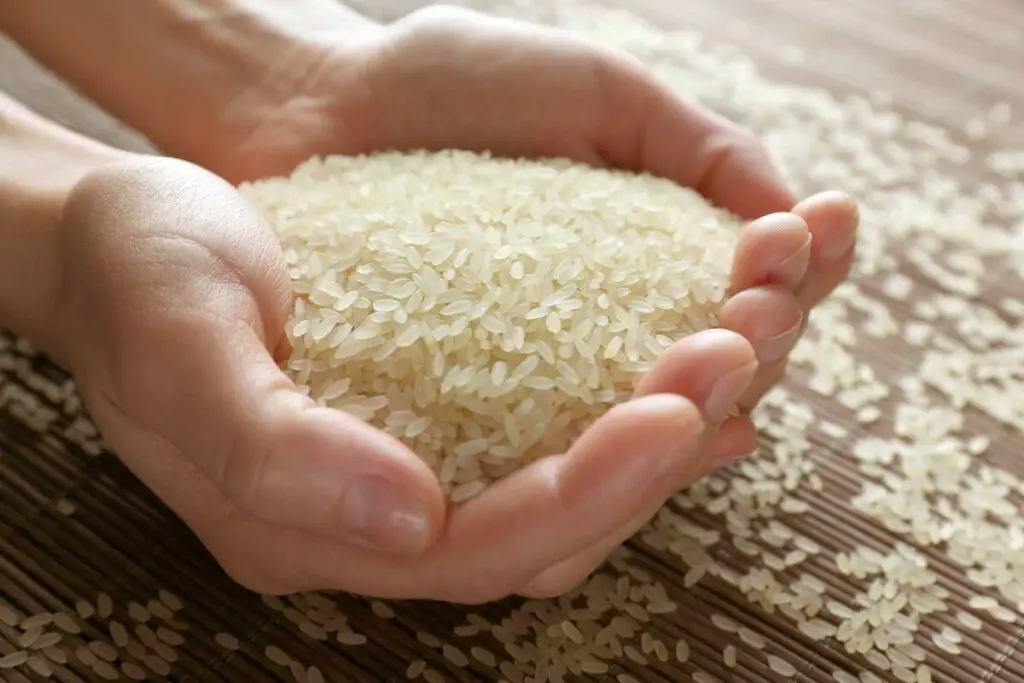
In your journey to manage IBS through diet, it’s important to understand that not all grains are created equal. While some grains can trigger IBS symptoms due to their FODMAP content, others can be more gut-friendly. Here’s a quick recap to help you balance grains and IBS for optimal health:
- Grains to Enjoy: Experiment with low-FODMAP grains like rice, quinoa, and oats. These are generally well-tolerated and can provide essential nutrients and fiber without exacerbating IBS symptoms.
- Grains to Limit: High-FODMAP grains such as wheat, barley, and rye can be triggers for some people with IBS. If you suspect these grains are problematic for you, try reducing or eliminating them from your diet.
- Individual Tolerance: Remember, everyone’s gut is unique. What works for one person with IBS may not work for another. Keep a food diary and pay attention to your body’s signals to identify your personal triggers.
- Consult a Professional: If you’re struggling to find the right balance, consider consulting a registered dietitian or a healthcare provider who specializes in IBS. They can help you create a personalized low-FODMAP diet that meets your nutritional needs.
As you navigate the complex relationship between grains and IBS, keep an open mind and stay curious about how different foods affect your symptoms. The goal is not to eliminate all grains from your diet, but to find a sustainable way of eating that supports your gut health and overall well-being.
Remember, managing IBS through diet is a dynamic process. New research and insights on the low-FODMAP diet and IBS emerge regularly, so stay informed and be open to making adjustments as needed.
By taking a proactive approach and seeking professional guidance when necessary, you can find a grain-inclusive diet that works for you and your gut.
Learn more about IBS and Food combinations with these articles:
- Best Snacks for IBS
- Good and Bad Vegetables for IBS
- Drinks for Irritable Bowel Syndrome
- How Dairy Affects IBS
- The Connection Between Meat and IBS
- https://www.ncbi.nlm.nih.gov/pmc/articles/PMC6110937/
- https://www.ncbi.nlm.nih.gov/pmc/articles/PMC7019579/
- https://www.ncbi.nlm.nih.gov/pmc/articles/PMC6627681/
- https://pubmed.ncbi.nlm.nih.gov/23983652/
- https://faculty.uml.edu/jhojnacki/83.123/Documents/CarbsandIrritableBowelSyndrome.pdf
- https://cherokee.ces.ncsu.edu/2023/09/exploring-the-benefits-of-eating-whole-grains/

